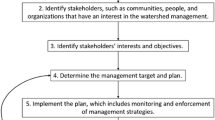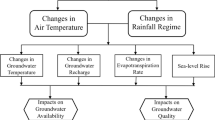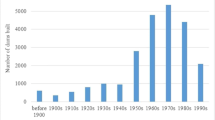Abstract
Property rights are important institutions that influence economic performance and reflect the historical, cultural, and political realities of particular societies. Drawing on a variety of concepts from legal and economic studies, a framework for explaining the origin and evolution of property rights is developed and applied to the specific case of changing ground water rights in Nebraska. The Nebraska case is an interesting example of reliance on local control in regulating water use. Despite the importance of local initiatives in ground water management, this case also illustrates the need for external support from the judicial and legislative systems. The evolution of ground water property rights in Nebraska, as in other parts of the United States, has been conditioned by historical circumstances and changing values and attitudes as well as by economic and political forces.
Similar content being viewed by others
References
Agra-Europe, newsletter on agriculture in the European Community, London, April 12, 1991.
Aiken, J. David. (1980). “Nebraska Ground Water Law and Administration,” 59Nebraska Law Review 917.
Aiken, J. David. (1993). “Protecting the Hidden Resource: The Quiet Crisis in Nebraska Pesticide and Ground Water Protection Policies.”Creighton Law Review, forthcoming.
Aiken, J. David. “Western Ground Water Law: Overview and Recent Developments.” Staff paper 1990–2, Dept. of Agric. Econ., University of Nebraska, Lincoln, 1990.
Anderson, Terry L., Oscar R. Burt, and David T. Fractor. “Privatizing Ground Water Basins: A Model and Its Application.” inWater Rights, edited, by Terry L. Anderson, San Francisco: Pacific Institute for Public Policy Research, 1983.
Barzel, Yoram.Economic Analysis of Property Rights. New York: Cambridge University Press, 1989.
Batie, Sandra. “Alternative Views of Property Rights: Implications for Agricultural Use of Natural Resources.”Am J of Ag Ec, 66-5(Dec., 1984): 814–818.
Bellah, Robert N., Richard Madsen, William Sullivan, Ann Swidler, and Steven Tipton.Habits of the Heart. New York: Harper and Row, 1986.
Bromley, Daniel (1989a). “Entitlements, Missing Markets, and Environmental Uncertainty.”J of Environ and Econ Management, 17: 181–194.
Bromley, Daniel (1989b). “Institutional Change and Economic Efficiency.”J of Econ Issues 23-3(Sept.): 735–59.
Bromley, Daniel. “Entitlements, Missing Markets, and Environmental Uncertainty: Reply.”J of Environ and Econ Management, 20 (1991):297–302.
Bromley, Daniel and Ian Hodge. “Private Property Rights and Presumptive Policy Entitlements: Reconsidering the Premises of Rural Policy.”Eur Rev of Ag Econ 17-2 (1990): 197–214.
Chan, Arthur H. “Rural Community Values in Groundwater Marketing.”J of Econ Issues, 24-2 (June, 1990): 463–73.
Cohen, G. A.Karl Marx's Theory of History: A Defense. Princeton: Princeton Univ. Press, 1978.
Coase, R. H. “The Problem of Social Cost.”J of Law and Econ, 3 (October, 1960).
Dore, M. H. I. and A. J. Ward. “Entitlements, Missing Markets and Environmental Policy.”J of Environ and Econ Management, 20 (1991): 290–296.
Faeth, Paul, Robert Repetto, Kim Kroll, Qi Dai, and Glenn Helmers.Paying the Farm Bill: US Agricultural Policy and the Transition to Sustainable Agriculture. Washington, DC: World Resources Institute, 1991.
Farrell, Joseph. “Information and the Coase Theorem.”J of Econ Perspectives, 1–2 (Fall, 1987):113–130.
Griffin, Ronald C. “The Welfare Analytics of Transactions Costs, Externalities, and Institutional Choice.” Unpublished manuscript, Dept. of Ag. Econ., Texas A&M Univ., 1989.
Hayami, Yujiro and Vernon W. Ruttan.Agricultural Development. Baltimore: The Johns Hopkins Univ. Press, 1985.
Kelman, Steven.What Price Incentives? Economists and the Environment. Boston: Auburn House Publishing, 1981.
Lynne, Gary D. and Jeffrey Burkhardt. “The Evolution of Water Institutions in Florida: A Neoinstitutionalist Perspective.”J of Econ Issues, 24-4 (Dec. 1990):1059–1077.
Nebraska Department of Agriculture.Nebraska Agricultural Statistics, Lincoln, October, 1990.
North, Douglass C. “Institutions.”J of Econ Perspectives, 5-1 (Winter, 1991): 97–112.
Nunn, Susan C. “Developing City Water Supplies by Drying Up Farms: Contradictions Raised in Water Institutions Under Stress.”Ag. and Human Values, IV-4 (Fall 1987): 32–42.
Ostrom, Elinor.Governing the Commons. New York: Cambridge University Press, 1990.
Quiggin, John. “Private and Common Property Rights in the Economics of the Environment.”J of Econ Issues, 22-4 (Dec., 1988): 1071–87.
Runge, C. Ford. “Strategic Interdependence in Models of Property Rights.”Am J of Ag Ec, 66-5 (Dec. 1984): 807–813.
Sagoff, Mark.The Economy of the Earth. New York: Cambridge University Press, 1990.
Schmid, A. Allan.Property, Power, and Public Choice. New York: Praeger, 1987.
Shaffer, James Duncan. “Selective Perceptions and the Politics of Agricultural Policy.” InThe Political Economy of US Agriculture: Challenges for the 1990s, edited by Carol Kramer. Washington, DC: Res. for the Future, 1989.
Stroup, Richard L. and John A. Baden.Natural Resources: Bureaucratic Myths and Environmental Management. San Francisco: Pacific Inst. for Public Policy Research, 1983.
Sugden, Robert. “Spontaneous Order.”J of Econ Perspectives, 3–4 (Fall, 1989): 85–98.
Swaney, James A. “Common Property, Reciprocity, and Community.”J of Econ Issues, 24-2 (June 1990): 451–62.
Tarlock, A. Dan. “Market Best Means to Manage Water.”The Lincoln Journal-Star, Lincoln, Nebraska, April 12, 1992.
The Lincoln Star, Lincoln, Nebraska, various issues.
Wandschneider, Philip R. “Neoclassical and Institutional Explanations of Changes in Northwest Water Institutions.”J of Econ Issues, 20-1 (March, 1986): 87–107.
Additional information
Helpful comments on this paper were provided by the Editor of this journal and two anonymous reviewers. University of Nebraska Agricultural Research Division Journal Series Number 9996.
E. Wesley F. Peterson is associate professor of agricultural economics at the University of Nebraska. Most of his research has been in the area of international agricultural trade with a focus on international institutions and policies.
J. David Aiken is professor in the Department of Agricultural Economics, University of Nebraska. He holds a JD from George Washington and is a specialist in the areas of agricultural and water law.
Bruce B. Johnson is professor of agricultural economics at the University of Nebraska. His research interests are primarily in natural resources and land economics. He also teaches part of a course in agricultural ethics.
Helpful comments on this paper were provided by the Editor of this journal and two anonymous reviewers. University of Nebraska Agricultural Research Division Journal Series Number 9996.
Rights and permissions
About this article
Cite this article
Wesley, E., Peterson, F., Aiken, J.D. et al. Property rights and groundwater in Nebraska. Agric Hum Values 10, 41–49 (1993). https://doi.org/10.1007/BF02217559
Issue Date:
DOI: https://doi.org/10.1007/BF02217559




